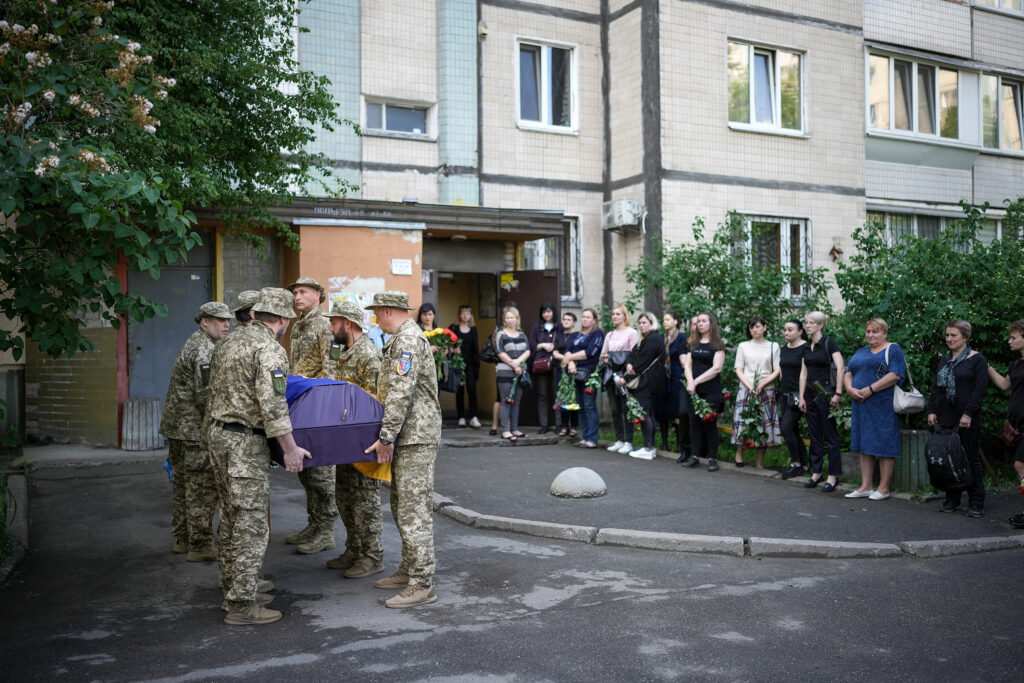Russian troops appear close to fully capturing the key Ukrainian city of Severodonetsk, jeopardizing the fate of two eastern provinces at the center of Moscow’s campaign of conquest and raising pressure on the U.S. and its European allies to quickly deliver advanced weapons systems to try to turn the tide.
Moscow’s forces have taken control of “most” of Severodonetsk, Britain’s Ministry of Defense said in a daily briefing Thursday — the result of pitched street battles and heavy artillery bombardment that has leveled swaths of the city near the banks of the strategically important Seversky Donets River.
Capture of the city could precipitate the fall of Luhansk, one of two eastern provinces bordering Russia, including Donetsk, that form the Donbas region where the Kremlin has concentrated its military might following its failure to seize the capital, Kyiv.

Serhiy Haidai, Luhansk’s regional governor, said via Telegram on Thursday that Severodonetsk had yet to fall and that Ukrainian soldiers had success dislodging Russian troops from some streets. He said Ukrainian forces were in touch with some residents hiding in bomb shelters, though he did not say how many. There are believed to be up to 12,000 civilians remaining in the city.
In a video address to lawmakers in Luxembourg, President Volodymyr Zelenskyy said that Russian forces now control almost 20% of Ukrainian territory — an area larger than Belgium, the Netherlands and Luxembourg combined. He said “tens of thousands” of people have died in the first 99 days of the war.
The grinding fight is emblematic of the war of attrition that U.S. officials say could drag on for months and that is forcing the West to ship increasingly sophisticated military equipment to bolster Ukraine’s defense. Kremlin spokesman Dmitry Peskov denounced the aid and its providers, saying Thursday that it would “bring more suffering to Ukraine, which is merely a tool in the hands of those countries that supply it with weapons.”
British Defense Secretary Ben Wallace said Thursday that the U.K. would send Kyiv an unspecified number of rocket launchers able to hit targets with precision up to 50 miles away. The announcement came a day after the U.S. promised to dispatch a similar rocket system, as well as helicopters and Javelin antitank weapons. The systems are superior to what Ukraine — whose troops will be trained in their use — currently owns.
In addition, Germany has newly pledged to provide antiaircraft missiles, and Slovakia said Thursday that it would send eight howitzers, though in a commercial deal rather than as military aid. Sweden also indicated its desire to donate anti-ship missiles, antitank weapons, semiautomatic rifles and munitions.
Russia has tried to thwart deliveries of Western arms, most recently Wednesday night when four cruise missiles fired from ships in the Black Sea struck railway infrastructure outside the western city of Lviv, causing significant damage, said Maksym Kozytsky, head of the Lviv region.
Four people were hospitalized in moderate condition, he said, and a fifth person had only moderate injuries and was not hospitalized. It was the latest example of Russia targeting Ukraine’s extensive rail network, which is a source of considerable pride among Ukrainians.
The strikes have caused extensive damage and delays on a rail system that has helped transport hundreds of thousands of displaced people to safety since the war began.
A school in the Kievsky district of Kharkiv was hit by Russian shells Wednesday night, Ukrainian emergency officials said, killing one woman and injuring a man.
Sustained, indiscriminate attacks on civilian targets have taken a massive toll on Ukraine’s children, Zelenskyy said in a video address Wednesday.
He said at least 243 children have died, 139 are missing and 446 have been injured since Russia invaded Feb. 24.
“These are only those we know about,” said Zelenskyy, who was marking International Children’s Day. “We do not yet have all the information from the territory that is currently occupied.”
In addition to the casualties, Zelenskyy said an estimated 200,000 children are among the many Ukrainians who have been relocated to Russia against their will. The youngsters include those from orphanages and children separated from their parents and families.
“This is one of Russia’s most heinous war crimes,” Zelenskyy said. “The Russian state disperses these people on its territory, settles our citizens, in particular, in remote regions. The purpose of this criminal policy is not just to steal people, but to make deportees forget about Ukraine and not be able to return.”
In a rare bright spot for the embattled country, Ukraine defeated Scotland 3-1 in an emotionally charged World Cup qualifying match Wednesday. The game in Glasgow was the first time the Ukrainian national men’s soccer team has appeared since the war began. The squad can participate in the World Cup in Qatar later this year if it defeats Wales on Sunday.
“Two hours of happiness,” Zelenskyy wrote in a Facebook post. “Something we are not accustomed to.”
___
© 2022 Los Angeles Times Distributed by Tribune Content Agency, LLC



